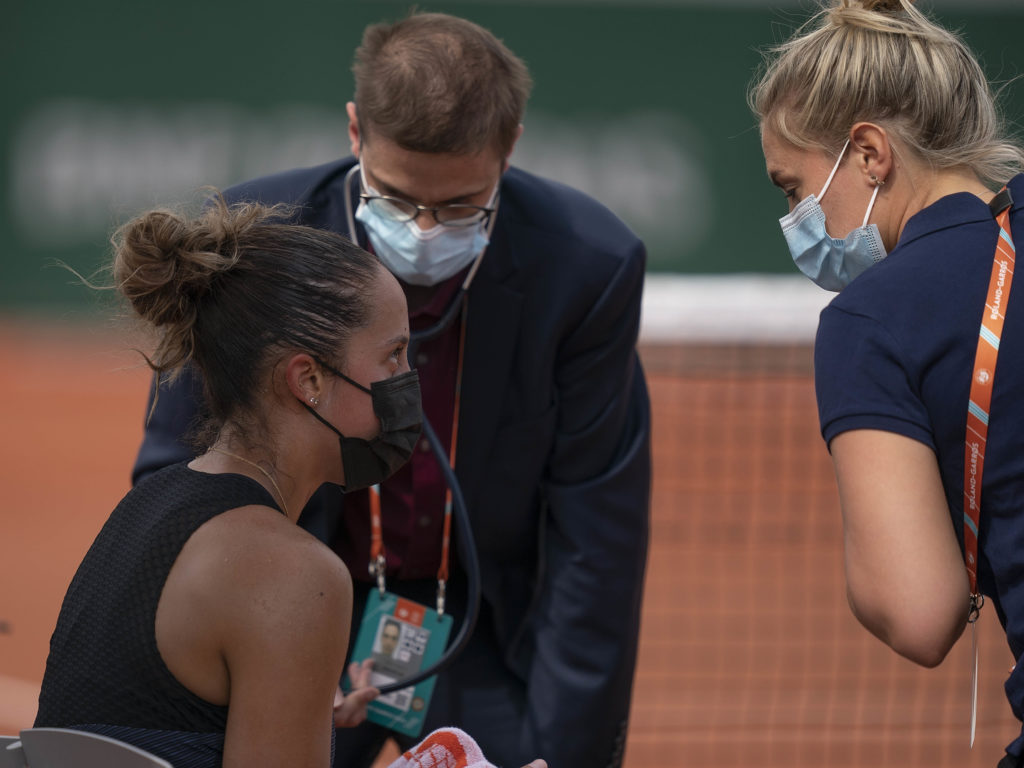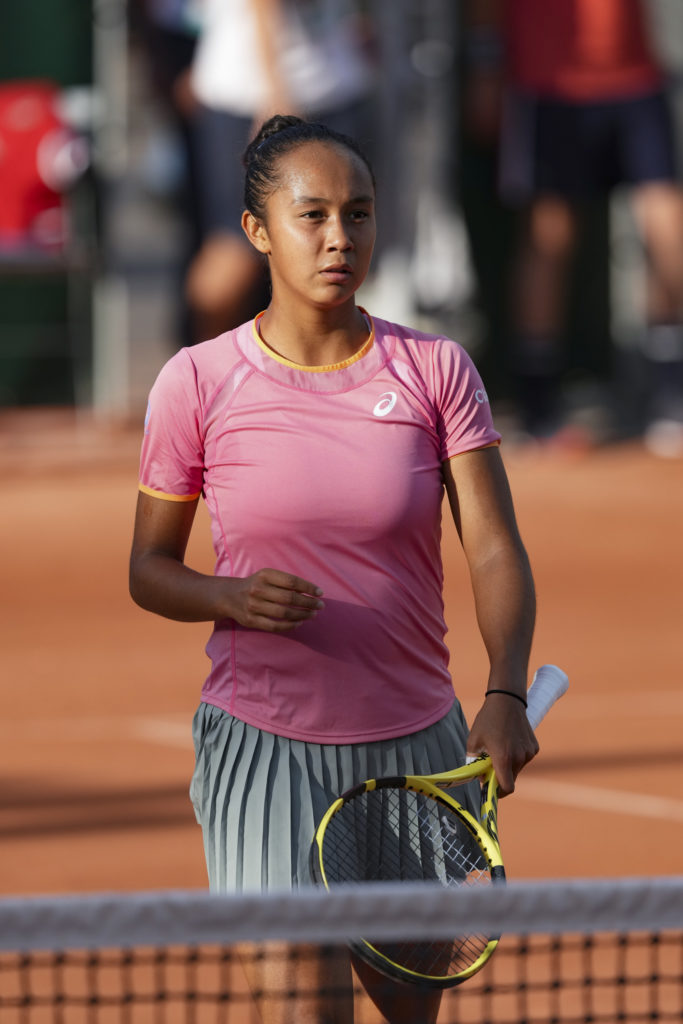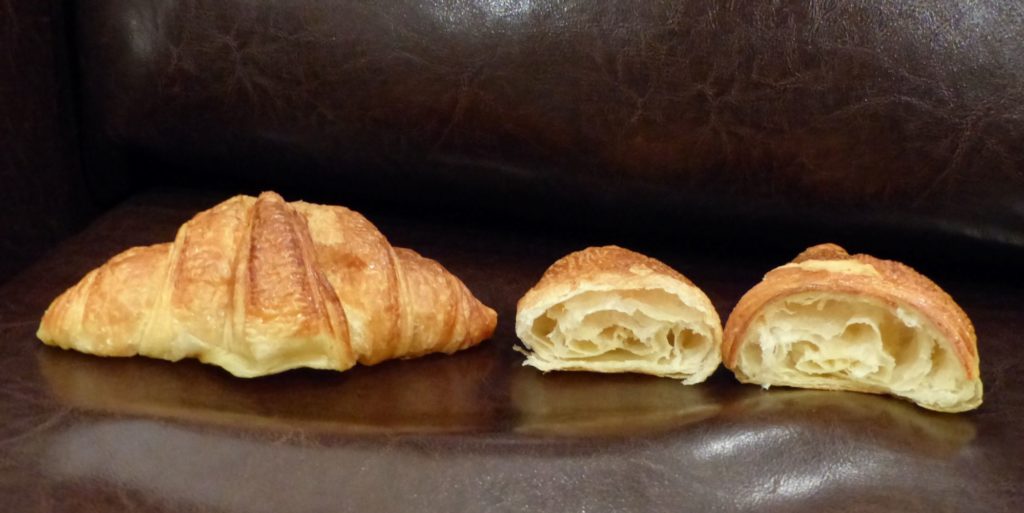Madison Keys is now 26 years old and it surprises many people in tennis that she has not accomplished more than she has – just one Grand Slam final appearance (2017 US Open). Ten years ago, when she played her first US Open, many so-called experts viewed her as a potential multiple major winner.
On Wednesday, for most of the second-round match at Roland Garros, Keys used her No. 1 asset – exceptional heavy hitting – to overwhelm Leylah Fernandez. It was the kind of clean ball striking that can make getting near the ball, or even getting a racquet on the ball, a challenge.
Ranked No. 24 and seeded No. 23, Keys hit the remarkable total of 23 winners (to five for Fernandez) in the second set alone on her way to a 6-1, 7-5 victory.

There was drama after the first set of the Court 6 match-up when Keys appeared to have a heart rate issue as a doctor came on court and took both her pulse and her blood pressure. At one point during the medical assessment with a doctor and a trainer, she could be heard saying, “it’s happened before but it’s never lasted this long.”
In the second set, the issue didn’t seem to noticeably affect her as she took 3-1 and eventually 5-3 leads. But some anxiety appeared when she tried to close out the match with Fernandez serving at 3-5. She missed three backhands holding triple match point at love-40 and then double-faulted badly and hit a poor drop shot on two more match points when she served at 6-5. She finally converted on the sixth with a well-struck, wrong-footing forehand winner.
The sheer weight and pace of the Keys ball striking rattled Fernandez in the opening set and the American was in complete control, taking a 3-0 lead and wrapping it up 6-1 in 29 minutes. The 58-minute second set was another story as Fernandez settled and made a contest of it – twice rallying from a break down – at 1-3 and 3-5. But Keys and her big-serving game (93 per cent, 13/14, first-serve points won in the opening set) as well as strafing backhands and forceful, flowing forehands proved too much to handle for Fernandez.
Talking about what she needed to do to close a match against Fernandez that required six match points, Keys said, “definitely making some first serves and just really staying in it and resetting after having those set points and not being able to convert them. Just really quickly resetting, not dwelling on it and moving forward. But she is such a great fighter. I kind of expected it. But, yeah, I was really happy to be able to close out that set the way that I did.”
About playing on a 26-degree day in the sunshine, Keys, in the ninth French Open event of her career, said, “I think all in all you can have days like today, then you can also have days where it’s cold and heavy. So you have to be ready for anything.
“I’m definitely more happy when it’s beautiful and sunshine in Paris.”
Come to think of it – who isn’t!
In Friday’s third round, Keys has a high-profile match-up against No. 15 seed Victoria Azarenka. The 31-year-old Belorussian won their only previous meeting 7-6(5), 2-0 when the American had to retire in the second round of the 2018 Miami Open.
Fernandez took the loss hard and was not very forthcoming in her post-match media conference.

The flip side of the fearsome intensity that drives her on the court is an inability – understandable at 18 – to have objectivity and perspective about the result, particularly when she loses.
“It was a tough match,” she said Wednesday, “but honestly I played a pretty horrible one, let’s say. At a scale of 1 to 10, I would say zero. I’m definitely not happy with the way I played. The way I acted on court, too. Everything considered, I deserved to lose this one.”
When prodded about playing better in the second set, she didn’t relent, insisting, “after match we all hate losing, especially me. I don’t see a positive at the moment.”
The Fernandez loss means there are no Canadians left in the singles draws at Roland Garros – Bianca Andreescu and Félix Auger-Aliassime were eliminated in the first round and Denis Shapovalov (shoulder) withdrew before the qualifying event began and Milos Raonic (calf) pulled out at the last minute before main-draw matches commenced.
As disappointing as that is, Canadian fans can now look forward to the grass-court season, and a surface that’s more complementary for most of their compatriots.
At the ATP 250 in Stuttgart next week, there will be four men in action – Shapovalov, Raonic, Auger-Aliassime and Vasek Pospisil. Of the nine – eight for Raonic and one for Shapovalov – ATP titles that those players have accumulated, none have come on grass. But Raonic has been in three finals (2016 at Wimbledon and Queen’s Club and 2018 at Stuttgart) while Auger-Aliassime reached the 2019 final in Stuttgart. So, there’s a decent chance things could change over the next few weeks.
As for the women, both the No. 7-ranked Andreescu and No. 69 Fernandez have limited experience on grass. Andreescu has played Wimbledon just once – qualifying and losing in the first round in 2017 to No. 105-ranked Kristina Kučová of Slovakia at just turned 17 years old. Fernandez has not competed in a Wimbledon main draw and was only 15 when she played three junior grass-court matches at the ITF event in Roehampton (England) and two at Wimbledon in 2018.
Andreescu is scheduled to play in Berlin in two weeks and then at the main Wimbledon prep event in Eastbourne the week before The Championships begin. The plans Fernandez has for grass are unknown at the moment.
A TASTE OF PARIS

One of the delights of Paris is a good croissant au beurre – especially in the morning. The one pictured here comes from a patisserie in the 16ieme arrondissement near the Michel-Ange Auteuil station, one of two Metro stops spectators use when they attend Roland Garros.






